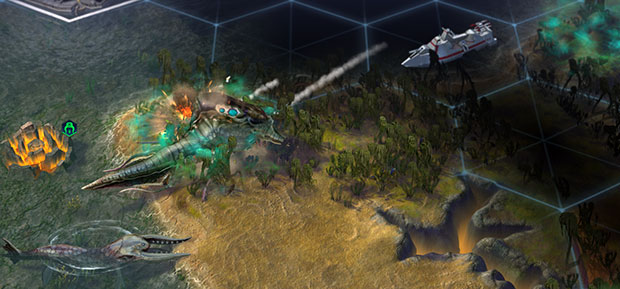

Being mobile, they allow a few interesting strategies such as snatching up late-game resource tiles only when they become important, and parking a string of offensive fortresses near an enemy’s borders. Said cities are, unfortunately, one of the more underwhelming new features despite the whole expansion’s name being a reference to them.

The North Sea Alliance has the most unique playstyle of the lot, getting big bonuses to using the new floating cities. “The “civs” themselves - even the new ones that come with Rising Tide - just aren’t different enough, with bonuses that are quickly washed out by affinity and leader personality choices just like their base-game predecessors. Even with the addition of two interesting new biomes – a Hoth-esque ice world and a fiery lava-world, each of which includes its own quest chain and subtle modifications to alien behavior – I feel like I’m watching the same movie with a set change rather than a new production. I think that has something to do with the fact that, like with the vanilla version of Beyond Earth, each campaign didn’t feel different enough from the last. Rough SeasIt feels odd to criticize an expansion that does everything it set out to do really well, but the fact is that Rising Tide reinvigorated Beyond Earth for me for around four campaigns, and now that I’m through with those, I don’t know that I’ll keep it installed much longer. It increases the incentive to explore every corner of the map and keep building explorers into the late game. This works a bit like a collectible card game and can unlock some very powerful bonuses for your civ, such as +2 movement speed for all workers. “Other marked improvements include the ability for your explorers to discover artifacts at dig sites or when pillaging alien nests. These treaties between leaders give a bonus to the initiator of the agreement You’re required to have a web of incoming and outgoing agreements to stay in the green, which creates a system that meshes together tightly and opens up new avenues for gameplay while making diplomacy an essential cornerstone to almost any playstyle. Diplomatic Capital can come from buildings and tile improvements, but also from making diplomatic agreements. This is augmented by selectable personality traits like Imperial, Industrialist, and Cultured, which provide bonuses to your whole civ, can be swapped or leveled up at an expenditure of the new Diplomatic Capital resource, and will influence how you are seen by other leaders based on how your traits align or clash with the traits they chose. Each leader now has a Respect and Fear value associated with every other leader, which serves as an excellent, two-axis barometer for how they are likely to treat you and their rival AIs. The overhauled diplomacy system, for starters, is the best it’s ever been in a Civ game of any stripe, and makes the largest positive impact of any new feature.


 0 kommentar(er)
0 kommentar(er)
